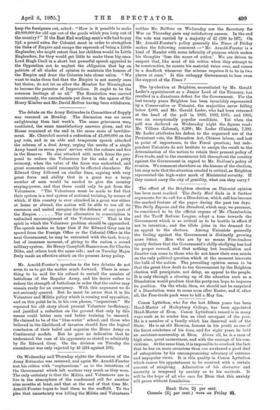The by-election at Brighton, necessitated by Mr. Gerald Loder's appointment
as a Junior Lord of the Treasury, has resulted in a disastrous defeat for the Government. For the last twenty years Brighton has been invariably represented by a Conservative or Unionist, the majorities never falling below 2,000, and Mr. Gerald Loder, who had been returned at the head of the poll in 1889, 1892, 1895, and 1900, was an exceptionally popular candidate. Yet when the poll was declared on Wednesday night the figures read; Mr. Villiers (Liberal), 8,209; Mr. Loder (Unionist), 7,392. Mr. Loder attributes his defeat to the organised use of the Protestant vote, the Education Act, Chinese labour, and last in point of importance, to the Fiscal question; but inde- pendent Unionists do not hesitate to assign the result to the determination of the nation to retain their present policy of Free-trade, and to the resentment felt throughout the country against the Government in regard to Mr. Balfour's policy of evasion. We comment elsewhere on the lessons of the election, but may note that the situation created is critical, as Brighton represented the high-water mark of Ministerial security. If they cannot carry the city of gentility, what can they carry ?










































 Previous page
Previous page